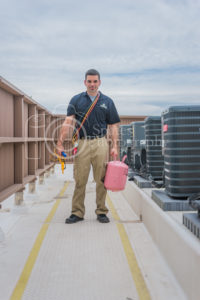 So you want to become an Hvac technician? Good call. Good, well trained Hvac technicians will never be without a job. There is always a demand for comfort. Although you will have to go through quite a bit of Hvac training before you can reach this stage, but once it’s reached, it’s pretty much job security for the rest of your life.
So you want to become an Hvac technician? Good call. Good, well trained Hvac technicians will never be without a job. There is always a demand for comfort. Although you will have to go through quite a bit of Hvac training before you can reach this stage, but once it’s reached, it’s pretty much job security for the rest of your life.
Think about all the buildings in big cities, apartment complexes, condos, homes, restaurants, they all require comfort. Comfort is delivered through technicians with proper hvac training to install those boilers for buildings, air conditioners for offices and homes, mini-splits for electrical rooms, ventilation for building fire controls, walk-in coolers for restaurants, etc. It’s never ending. If you like hands on troubleshooting and job security, then becoming an Hvac technician will secure your future. It is a job that will always be in demand and there is no fear of it ever being automated.
Recommended Path for Hvac Training
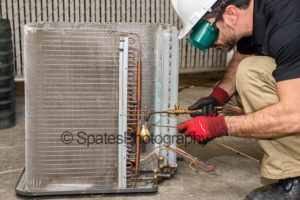 I started my Hvac career well over a decade ago doing apartment maintenance. I was trained by untrained maintenance technicians on how to just ‘get the unit running’. We were dealing with mainly 10-20 year old R-22 units. When something went wrong, it was either a run capacitor replacement or just add refrigerant until the suction line was ‘beer can cold’. Not the best path these days for proper Hvac training. R-22 is set to be phased out in 2020.
I started my Hvac career well over a decade ago doing apartment maintenance. I was trained by untrained maintenance technicians on how to just ‘get the unit running’. We were dealing with mainly 10-20 year old R-22 units. When something went wrong, it was either a run capacitor replacement or just add refrigerant until the suction line was ‘beer can cold’. Not the best path these days for proper Hvac training. R-22 is set to be phased out in 2020.
SEER ratings are going up for the minimal new unit installation. There is more technical ‘know how’ when it comes to residential HVAC now than ever. Commercial refrigeration is the same thing, but requires much more Hvac training. Everything in this article is my opinion and should be taken as so. I have serviced, installed and repaired thousands of HVAC units both residential and commercial. I have worked along side people that have been in the industry over 40 years that lived, breathed, and never shut up about HVAC.
First step to become a certified Hvac technician in my opinion, is to go to an accredited college that also offers job placement working as a mentor upon class completion. HVAC colleges are only about a year or two. Then you join an apprenticeship program where you will work aside veteran Hvac technicians for a couple of years before you are out on your own. This is the way to go. This is what the economy needs, your customers need. People that pay good money for comfort should be serviced by a qualified Hvac technician that has experience under their belt. There are way to many variables then just charging a system to ‘beer can cold’.
Reputable colleges will cover all the hvac training basics you will need to know out in the field. You will have to know a little math, and your problem solving skills must be phenomenal if you want to thrive in this business. Getting a degree from a reputable college will let employers know that you have gone through plenty of technical hvac training.
Minimal Hvac training for Beginners to become a technician
There is one certification that you are going to need if you want to become an hvac technician. That is the Universal EPA Certificate. There are 3 types of EPA certifications that you can get. Type 1, 2 and 3. If you are serious about becoming an Hvac technician though I would strongly recommend that you get them all. This is also known as the Universal Epa Certificate, which basically means you can work on anything.
Type one means you can work on small appliances, type two means you can work on high pressure systems, type 3 means you can work on low pressure systems. You can search and see which ones will best fit your needs, but believe me, having them all will only help you in the long run.
Basically the EPA Certification is not going to make you a great HVAC technician alone. But it is absolutely mandatory to have. Once you have it, you got it forever. Plus no one is going to want to hire you if you don’t have it. So study for the test, pass all 3 certifications, and then companies will be more inclined to take you on especially if you have great work ethic.
Another Hvac certification you should want to pursue
NATE Hvac certification. Many of the larger Hvac companies are now requiring their technicians to get NATE certified. NATE is an acronym for North American Technical Excellence. The test costs money to take and there are two parts. One is the Core and there are several specialty areas that you can get certified for. The test is pretty hard, and you will have to keep up on your education Hvac training hours to get re certified. NATE certification is not recommended for those that are just starting out in the industry. HVAC techs with 2 or more years of service in the field should pursue NATE certification. More information can be found on their website.
On the Job Hvac Training for Beginners
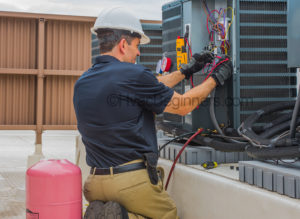 Hvac technician on the job training. This is by far the best type of Hvac training that any one person can get. In my opinion of course. You can go to school for years and learn all the basic and advanced principles of troubleshooting and installation of hvac systems. The things that these hvac schools are going to give you is the experience of a customer yelling at you because their brand new central air and heating system they just spent 6 grand on isn’t working right. They won’t teach you how to fit a air handler coil that your replacing that’s 2 feet width into an attic access that’s only a foot and a half.
Hvac technician on the job training. This is by far the best type of Hvac training that any one person can get. In my opinion of course. You can go to school for years and learn all the basic and advanced principles of troubleshooting and installation of hvac systems. The things that these hvac schools are going to give you is the experience of a customer yelling at you because their brand new central air and heating system they just spent 6 grand on isn’t working right. They won’t teach you how to fit a air handler coil that your replacing that’s 2 feet width into an attic access that’s only a foot and a half.
Hvac programs and courses, more than likely also won’t teach you that you must check all replaceable parts such as condensing coils and compressors upon arrival. That you need to make sure they are actually the parts you ordered before you haul them up a 24ft extension ladder to the roof and then realize you have the wrong parts. You are going to make several mistakes in your career as an hvac technician. Some may be costly, some may be dangerous. You need to learn from these. Make the mistake once and don’t make it again, learn from it.
Choosing Your HVAC Job Profession
There are several types of professions that you can pursue once you become HVAC certified. I am going to list them in importance on which you should pursue first. This is STRICTLY my opinion as I have spent over a decade in the field. There are maintenance technicians, service technicians, installers, factory workers such as sheet metal specialists, system engineers, and equipment engineers/manufacturers. If I left some professions out, then sorry, let me know in a comment.
Maintenance Technicians
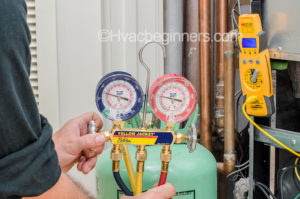 In my opinion, upon graduation from an accredited HVAC training degree, you need to start off as a maintenance technician. Maintenance technicians generally keep the hvac system up to par. Maintenance Technicians in the Heating and Cooling industry look for potential problems with hvac system. Some of the duties maintenance technicians should perform are …
In my opinion, upon graduation from an accredited HVAC training degree, you need to start off as a maintenance technician. Maintenance technicians generally keep the hvac system up to par. Maintenance Technicians in the Heating and Cooling industry look for potential problems with hvac system. Some of the duties maintenance technicians should perform are …
- checking refrigerant levels to ensure system is enclosed/leak free
- ensuring proper air flow
- cleaning condensing and evaporator coils
- taking amp draws on motors to make sure they are operating within manufacturer specs
- cleaning drain pans and drain lines
- checking thermostat batteries or hard wiring thermostat to constant power so batteries aren’t needed
- changing filters
- checking for potential problems in general that could affect the customers HVAC system(s)
Hvac Service Technicians
After a couple years of servicing multiple units as a maintenance technician, the next step would be a service technician. Service technicians deal with the no-cools and no-heats. So basically when they are called out there is a problem that needs to be addressed and fixed. They are not usually designated to maintain systems so that they can run efficiently.
They are the ones who answer when shit hits the fan. Hvac service technicians are can be classified as residential or commercial. Basic rule of thumb is you better have your residential down to a science before stepping into commercial service. There are a whole lot more controls, cooling and heating capacity, and overall way more types of heating, ventilation and cooling systems on the commercial side of this field.
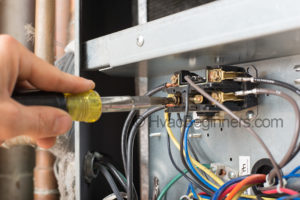 Service technicians also are required to go on a 24-hour ‘on call’ rotation. This is where you will gain the bulk of your experience, I guarantee it. The more you are on-call, the more you will learn. The more you will be forced to put your brains stored knowledge of hvac to use when trying to figure out what the fuck do you do, especially when you have incoming calls for jobs after the one you are on.
Service technicians also are required to go on a 24-hour ‘on call’ rotation. This is where you will gain the bulk of your experience, I guarantee it. The more you are on-call, the more you will learn. The more you will be forced to put your brains stored knowledge of hvac to use when trying to figure out what the fuck do you do, especially when you have incoming calls for jobs after the one you are on.
You will learn a lot from being on call, you will work a lot, and you will also make a lot of money by taking on-call. Most reputable companies will eventually require you to go on emergency on-call so take that into consideration when choosing this profession.
Hvac Installers
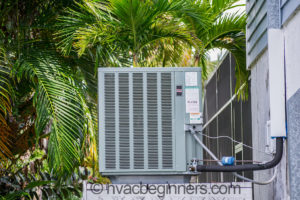 Once you have several years under your belt as a service technician, then may want to pursue a career as an installer. Unfortunately, this is not how the hvac service industry works. Workers coming out of training, if they have had any at all, usually immediately go to install. Inexperienced installers are a service technicians nightmare, as well as the customer. I can’t count the times I had to go back on a brand new system that was just installed to replace a TXV because the installer brazed the air handler in and didn’t disconnect the bulb from the factory, bulb gets to hot and fails.
Once you have several years under your belt as a service technician, then may want to pursue a career as an installer. Unfortunately, this is not how the hvac service industry works. Workers coming out of training, if they have had any at all, usually immediately go to install. Inexperienced installers are a service technicians nightmare, as well as the customer. I can’t count the times I had to go back on a brand new system that was just installed to replace a TXV because the installer brazed the air handler in and didn’t disconnect the bulb from the factory, bulb gets to hot and fails.
Inexperienced installers and start up crews can cause serious problems for customers and hvac service technicians. If you are an installer and work for a big company, I’m sure you have gotten heat from the service technicians if you’ve screwed up multiple times.
HVAC Apprenticeship Programs
Working alongside seasoned Hvac technicians will teach you tricks of the trade that you will not learn in trade school. The more technicians you work with, the more things you are going to learn. The more things you are going to want to unlearn as well. There is a standard procedure for pretty much everything when it comes to troubleshooting heating, ventilation and cooling systems. But you will quickly learn that everyone has a different work flow. Everyone approaches situations differently in some shape of form.
Things like ‘how often should I change my vacuum pump oil”? Do I really need to take amp readings on these different components? To do everything correctly on the job may take you 2-3 hours. But your boss only quoted you for 1 hour or the company loses money. How do you handle these situations? You will run into them. You will have another call ahead of you scheduled for 4pm but it’s already 3:30pm and you haven’t even figured out how to resolve the issue you are currently on.
This is real life Hvac training. Working along side the veterans of the hvac industry is going to widen your options on how you can handle these sticky situations professionally. While still doing competent work and doing your designated job, which is taking care of the customer.
Become a Great HVAC Service Technician
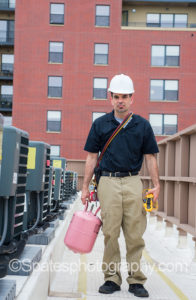 Whether you want to thrive as a top technician of your local business, or you want to eventually start an Hvac company of your own, you will need experience under your belt. Don’t expect to take a 1 year college course on Hvac training and come out lighting the world up with your problem solving skills. To become great you need experience. To become likeable you have to listen to the customers complaints. You have to solve the customers complaints. Most importantly, you have to look clean and professional. Keep a good clean hair cut, be well groomed, keep your shirt tucked in for Christ sakes. If your service van is dirty run it through the damn car wash.
Whether you want to thrive as a top technician of your local business, or you want to eventually start an Hvac company of your own, you will need experience under your belt. Don’t expect to take a 1 year college course on Hvac training and come out lighting the world up with your problem solving skills. To become great you need experience. To become likeable you have to listen to the customers complaints. You have to solve the customers complaints. Most importantly, you have to look clean and professional. Keep a good clean hair cut, be well groomed, keep your shirt tucked in for Christ sakes. If your service van is dirty run it through the damn car wash.
You would be surprised how much the little things such as appearance can perceive the eyes of the customer. Number one rule is show up on time. I know that sometimes this is not always possible due to bulks of calls during the day, but there is no excuse for not showing up 10 minutes early for your first job of the day. I worked in the field many years and drove anywhere from 45 minutes to an hour and a half to reach my first call, and I was late one time due to a major car accident. Show up within the designated time frame. If you are on a job that is taking longer than normal call your dispatcher and let them know and see if they can get someone else out there.
If you are a one-person show and are running late for your next appointment, step aside for 5 minutes and let the customer know that you are running behind. No one likes waiting. Especially without any updates. Update the customer if you are running late. Make your time windows. Show up with a professional looking appearance, professional looking work van, deliver exceptional service, and you will thrive at this career. You will get good reviews. No matter how good you are you will always get some bad ones, but you can limit yourself to the bad ones by following these fundamentals.
Never stop learning. Take every single manufacturer class that you can. Don’t use Hvac training days as an excuse to take a break from running calls. Bring a note pad and write down notes from the instructor. Continuing education from Hvac manufacturers is the best type of training that you can get. They know their equipment. Ask questions, lots of them. Get their work number, or who to contact when you run into a jam.
There are so many different types of equipment out there. Knowing who to call for tech support is crucial. I don’t care how long you’ve been an Hvac technician, everyone runs into a jam and everyone needs to call tech support every now and then. This is all of course, from my experience of over 10 years of on the job hvac training, yours may differ from mine.
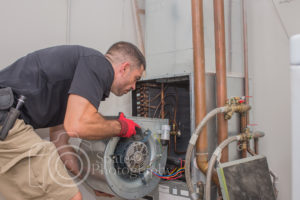
I’m very interesting to take this training